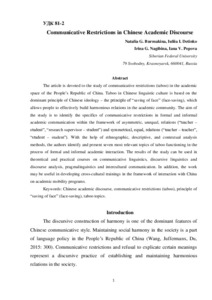Communicative Restrictions in Chinese Academic Discourse
URI (для ссылок/цитирований):
http://journal.sfu-kras.ru/article/135160https://elib.sfu-kras.ru/handle/2311/143197
Автор:
Бурмакина, Наталья Геннадьевна
Детинко, Юлия Ивановна
Нагибина, Ирина Геннадьевна
Попова, Яна Викторовна
Коллективный автор:
Институт филологии и языковой коммуникации
Кафедра теории германских языков и межкультурной коммуникации
Дата:
2020Журнал:
Journal of Siberian Federal University - Humanities and Social SciencesКвартиль журнала в Scopus:
Q3Библиографическое описание:
Бурмакина, Наталья Геннадьевна. Communicative Restrictions in Chinese Academic Discourse [Текст] / Наталья Геннадьевна Бурмакина, Юлия Ивановна Детинко, Ирина Геннадьевна Нагибина, Яна Викторовна Попова // Journal of Siberian Federal University - Humanities and Social Sciences. — 2020. — Т. 13 (№ 3). — С. 304-315Аннотация:
The article is devoted to the study of communicative restrictions (taboo) in the academic space of the People’s Republic of China. Taboo in Chinese linguistic culture is based on the dominant principle of Chinese ideology – the principle of “saving of face” (face-saving), which allows people to effectively build harmonious relations in the academic community. The aim of the study is to identify the specifics of communicative restrictions in formal and informal academic communication within the framework of asymmetric, unequal, relations (“teacher – student”, “research supervisor – student”) and symmetrical, equal, relations (“teacher – teacher”, “student – student”). With the help of ethnographic, descriptive, and contextual analysis methods, the authors identify and present seven most relevant topics of taboo functioning in the process of formal and informal academic interaction. The results of the study can be used in theoretical and practical courses on communicative linguistics, discursive linguistics and discourse analysis, pragmalinguistics and intercultural communication. In addition, the work may be useful in developing cross-cultural trainings in the framework of interaction with China on academic mobility programs.

